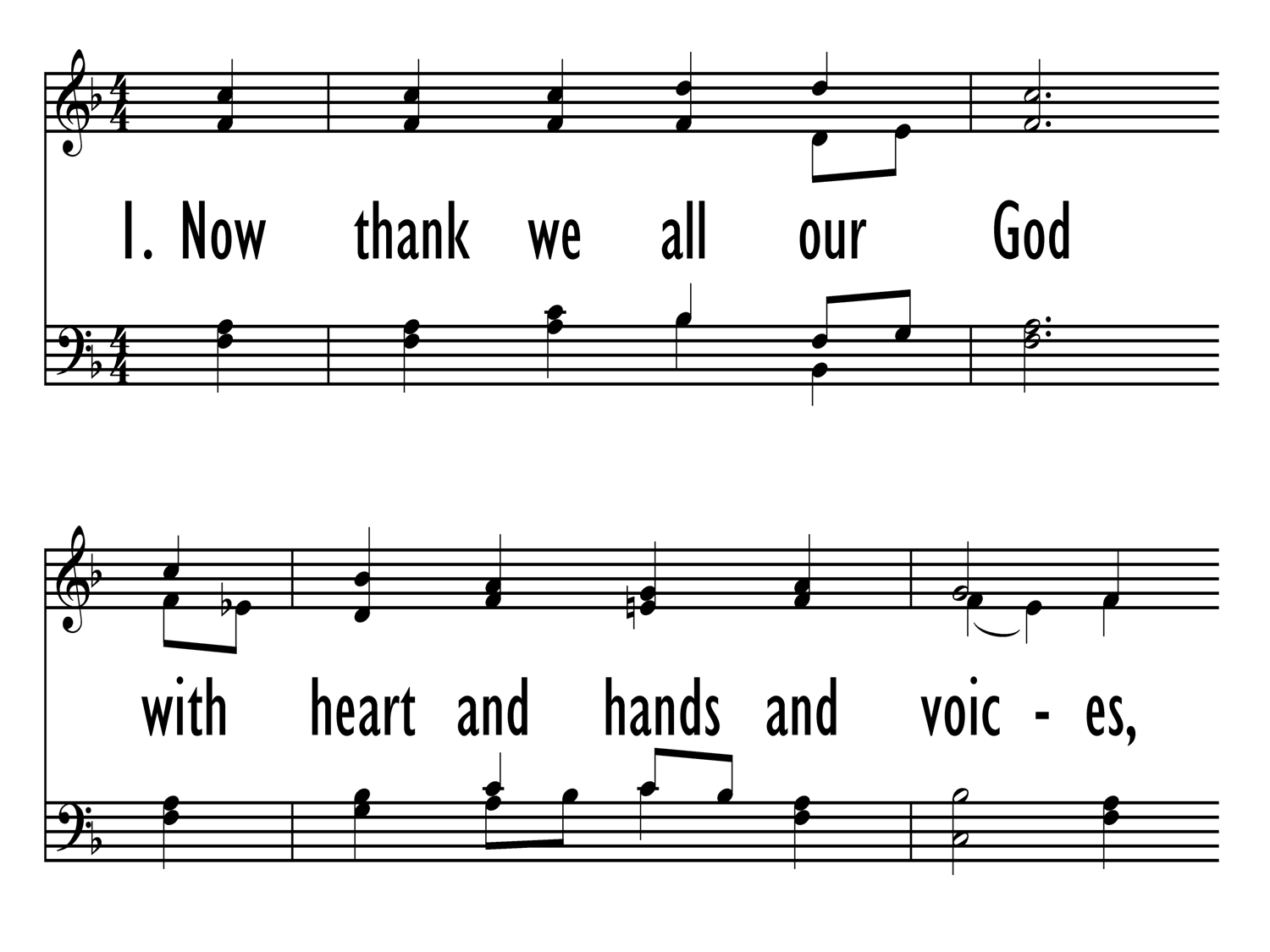- |
User Links
Now Thank We All Our God
Hymn Information
- First Line
- Now thank we all our God
- Author
- Martin Rinkart (1636)
- Translator
- Catherine Winkworth (1863, alt.)
- Tune Name
- NUN DANKET
- Composer
- Johann Crüger (1647)
- Harmonizer
- Felix Mendelssohn (1840, alt.)
- Tune Source
- harm. Felix Mendelssohn's <cite>Lobgesang</cite>, Opus 52, 1840
- Topic
- Church Year: Trinity Sunday · Doxologies · God's: Providence · Joy · Occasional Services: Thanksgiving/Harvest · Praise of God · Thankfulness · Elements of Worship: Praise and Adoration
Copyright Information
- Text Copyright
- Public Domain
- Tune Copyright
- Public Domain
- Reprint/Projection Information
- Words and Music: The Words and Music are in the Public Domain; you do not need permission to project or reprint the Words and Music.
Full Text
Scripture References
Further Reflections on Scripture References
The text alludes to the apocryphal book of Ecclesiasticus 50:22-24 (part of the Lutheran Bible), which reads: "Now bless the God of all, who in every way does great things," Stanza 1 thanks God for, what he has done in the past; stanza 2 prays for God's guidance in the future; stanza 3 is a Trinitarian doxology styled after the "Gloria Patri." Stanzas 1 and 2 were originally meant to be sung as a table grace; stanza 3 was added later as a Trinitarian doxology. (Stories that Rinkart wrote his text for the Peace of Westphalia of 1648 are incorrect, although this hymn was used in the celebrations of that year.)
Bert Polman, Psalter Hymnal Handbook
Confessions and Statements of Faith References
Further Reflections on Confessions and Statements of Faith References
The God who was active in providing his Son for our redemption, has also been active in the course of history and in the lives of his people. His activity in the course of history began when he created all things. Belgic Confession, Article 12 teaches that God, “when it seemed good to him, created heaven and earth and all other creatures from nothing, by the Word—that is to say, by the Son.” In addition, “God created human beings from the dust of the earth and made and formed them in his image and likeness.”
His activity also includes his constant care for all he has created. “…He watches over us with fatherly care, sustaining all creatures under his lordship” (Belgic Confession, Article 13). Additionally, God reveals himself by this “creation, preservation and government of the universe, since that universe is before our eyes like a beautiful book...” (Belgic Confession, Article 2).
We also believe that God’s mighty acts are revealed “in the unfolding of covenant history…witnessing to the news that Our World Belongs to God and he loves it deeply” (Our World Belongs to God, paragraph 33). Primary among these actions in the unfolding of covenant history is “the long road of redemption to reclaim the lost as his people and the world as his kingdom” (paragraph 18). As God’s people observe his work in their lives and in history they respond with praise and adoration.
Now Thank We All Our God
Call to Worship
Words of Praise
Assurance
Blessing/Benediction
Additional Prayers
Now Thank We All Our God
Tune Information
- Name
- NUN DANKET
- Key
- F Major
- Meter
- 6.7.6.7.6.6.6.6
Recordings
Musical Suggestion
Clasp hands / spread arms out and up
with heart / and hands / and voices,
cross hands over heart / palms together / cup hands around mouth
who wondrous things has done,
raise left hand in wide arc from right to left
in whom his world rejoices;
raise right hand in wide arc, both hands extended high
who from our mother's arms
cradle arms and rock
has blessed us on our way
move hands beat by beat away from body
with countless gifts of love,
raise arms up and out in wide arc
and still is ours today.
cross arms over heart


 My Starred Hymns
My Starred Hymns






